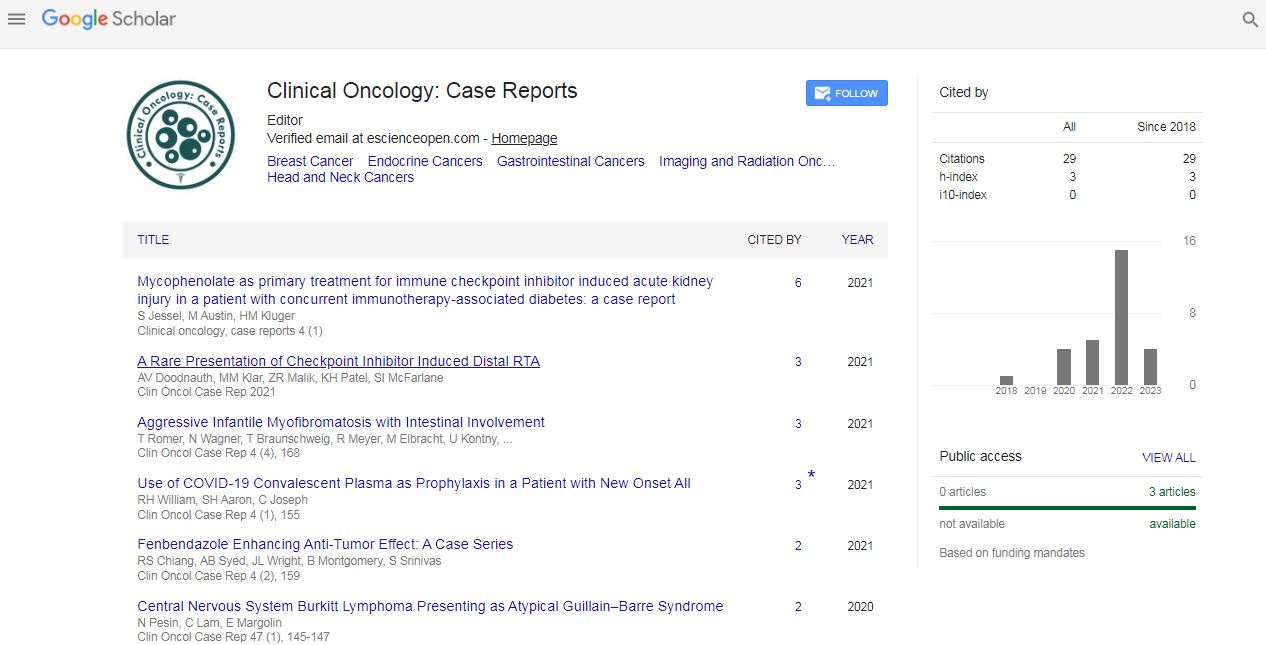Opinion Article, Clin Oncol Case Rep Vol: 6 Issue: 11
Progress in Pancreatic Cancer Research
Carlos A. Cardenas1*, Jose Javier Bravo2
1FORESC (Foundation For Research and Sciences), USA
2St. Francis Downtown Hospital,USA
*Corresponding Author: Carlos A. Cardenas, FORESC (Foundation For Research and Sciences)
USA
E-mail: karmed@live.com
Received: November 08, 2023; Manuscript No: COCR-24-125111
Editor Assigned: November 20, 2023; PreQC Id: COCR-24-125111 (PQ)
Reviewed: November 23, 2023; QC No: COCR-24-125111 (Q)
Revised: November 25, 2023; Manuscript No: COCR-24-125111 (R)
Published: November 29, 2023; DOI: 10.4172/cocr.6(11).323
Citation: Cardenas AC, et al. Progress in Pancreatic Cancer Research Clin Oncol Case Rep 6:11
Abstract
This opinion article meticulously explores recent advancements in pancreatic cancer research, delving into precision therapeutics, early detection strategies, genetic insights, and global epidemiological perspectives. From breakthroughs in precision oncology to the intricacies of survivorship, the narrative is underpinned by key statistical data, providing an unparalleled overview of the current state of pancreatic cancer research.
Keywords: Carlos A. Cardenas1*, Jose Javier Bravo2
Introduction
Pancreatic cancer is a medical domain entangled with challenges like late-stage diagnoses and restricted treatment modalities. The endeavor here is to expound upon recent strides in pancreatic cancer research, dissecting precision therapeutics, imperatives for early detection, genetic revelations, and the overarching global epidemiological context within the rigorous framework of medical and scientific inquiry.
Opinion
Recent research signals a transformative shift in therapeutic approaches, particularly within the realm of precision oncology. Targeted modalities, exemplified by advancements in RET-altered thyroid and lung cancers, emerge as promising avenues for revolutionizing pancreatic cancer treatment [1]. Initiatives like the NCI-funded New Onset Diabetes (NOD) [2]. Study and the Pancreatic Cancer Detection Consortium underscore the pivotal role of early detection in enhancing diagnostic acumen [3].
Genetic revelations extend beyond familial antecedents, meticulously redefining risk stratification. The indispensable role of genetic counselors in informed decision-making is accentuated. The introduction of germline testing, regardless of familial history, marks a paradigm shift, ushering in a personalized preventive approach that revolutionizes pancreatic cancer prevention [4].
The discourse on post-treatment survivorship accentuates a holistic ethos, seamlessly integrating physical, emotional, and lifestyle dimensions into a patient-centric continuum of care. Recognizing the nuanced journey beyond treatment not only fosters overall well-being but also addresses the multifaceted challenges encountered by pancreatic cancer survivors.
Epidemiological insights provide a comprehensive understanding of pancreatic cancer's global prevalence and mortality. Incidence rates, particularly in Northern America and Western Europe, manifest at 5.5 per 100,000 for men and 4.0 per 100,000 for women [5]. Crucial statistics, including an average lifetime risk of 1 in 64 and the predominant diagnoses occurring in individuals over the age of 60, equip stakeholders for targeted interventions and the formulation of effective public health measures [5].
Final Thoughts
This discourse serves not merely as a conclusion but as an imperative for the scientific and medical community engaged in unraveling the intricacies of pancreatic oncology. The amalgamation of precision therapeutic strategies, early detection imperatives, and global insights constructs a knowledge tapestry that illuminates the multifaceted dimensions of pancreatic cancer. Positioned at the nexus of transformative progress, our collective mandate demands a sustained commitment to rigorous scientific inquiry, interdisciplinary collaboration, and an unwavering pursuit of advancements in the fields of medicine, oncology, and genetic research.
The narrative surrounding pancreatic cancer, once shrouded in obscurity, now stands on the precipice of conquerability. Precision Therapeutics, epitomizing targeted modalities akin to advancements witnessed in RET-altered thyroid and lung cancers, represents a paradigmatic shift, instilling hope within the domain of oncological research. Initiatives such as the NCIfunded New Onset Diabetes (NOD) Study and the Pancreatic Cancer Detection Consortium underscore the paramount importance of early detection as a foundational element in advancing diagnostic acumen within the scientific and medical communities.
Genetic revelations, extending beyond familial antecedents, redefine our approach to risk stratification and decisionmaking. Genetic counselors emerge as indispensable guides within the intricate landscape of personalized preventive paradigms, reshaping our understanding of pancreatic cancer prevention. This transformative approach, anchored in the realms of science and medicine, establishes a foundation for tailored and efficacious strategies in cancer care.
Beyond the scope of treatment, this discourse champions a holistic survivorship ethos, seamlessly integrating physical, emotional, and lifestyle dimensions into a patient-centric continuum of care. Acknowledging the individual journey beyond treatment underscores the importance of resilience and optimization of overall well-being for pancreatic cancer survivors within the framework of medical and oncological practices.
Epidemiological insights, derived from global prevalence and mortality data, equip stakeholders with knowledge essential for targeted interventions. Armed with statistics that unveil heightened incidence rates in specific regions and age-related patterns, public health measures can be refined through a scientific lens, addressing the diverse needs of populations within the context of medical and oncological sciences.
As this synthesis concludes, it does not mark an endpoint but rather a prologue—an ushering into a future where pancreatic cancer succumbs to the relentless tenacity of collective human endeavor grounded in scientific rigor. Ongoing research, collaborative efforts, and the assimilation of knowledge from diverse scientific sources position us at the forefront of transformative progress. The narrative of pancreatic cancer, once enshrouded in the complexity of medical-oncological sciences, is now unfolding, promising improved outcomes for those impacted by this disease.
References
- Pancreatic Cancer Treatment.
- New-Onset Diabetes: An Early Sign of Pancreatic Cancer? - NCI.
- Pancreatic Cancer Detection Consortium (PCDC) [CrossRef]
- Cardenas CA, Abrishami S, and Bravo JJ,(2024) . Pancreatic Cancer: Review on Advancements, Precision Therapies, and Beyond . Zenodo.1 [Google Scholar] [CrossRef]
- Pancreatic Cancer Treatment
 Spanish
Spanish  Chinese
Chinese  Russian
Russian  German
German  French
French  Japanese
Japanese  Portuguese
Portuguese  Hindi
Hindi 